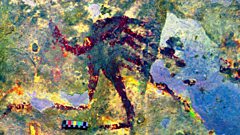Earliest hunting scene cave painting; animal domestication syndrome
A cave painting in Indonesia at least 43,900 years old is thought to be the earliest hunting scene in human history. Classic Russian farm fox domestication experiment is flawed.
A cave painting in Sulawesi, Indonesia, has been dated and is at least 43,900 years old. The mural portrays a group of part-human, part-animal figures (called therianthropes), hunting large mammals with spears and ropes. It is thought to be the oldest representation of a hunting scene in human history, and perhaps Homo sapiens' oldest known figurative rock art. Adam Brumm at Griffith University in Brisbane is part of an international team that has been exploring this cave complex. He speculates with Adam Rutherford about who the artists were and what they were trying to depict.
A famous Russian farm fox study has been running since the 1950’s. The researchers essentially took foxes bound for the fur trade and selected for tameness by choosing to keep and breed from the animals that showed less fear and more friendliness towards humans. After years of selection, the tamer foxes also showed physical changes (floppier ears, curlier tails, white spots, redder fur) as well as changes in breeding times. As a way to study the evolution of domestication of animals, this study is taught to students all over the world. However a chance discovery at a Fox Museum on a Canadian Island, shows the original foxes were taken from fur farms in Canada and had already been bred for tameness. Elinor Karlsson at the Broad Institute at MIT and Harvard University discusses with Adam whether we have to rethink the Animal Domestication Syndrome.
Producer - Fiona Roberts
Last on
![]()
Βι¶ΉΤΌΕΔ Inside Science is produced in partnership with The Open University.
Broadcasts
- Thu 12 Dec 2019 16:30Βι¶ΉΤΌΕΔ Radio 4
- Thu 12 Dec 2019 21:00Βι¶ΉΤΌΕΔ Radio 4
Explore further with The Open University
Βι¶ΉΤΌΕΔ Inside Science is produced in partnership with The Open University.
Podcast
-
![]()
Βι¶ΉΤΌΕΔ Inside Science
A weekly programme looking at the science that's changing our world.




